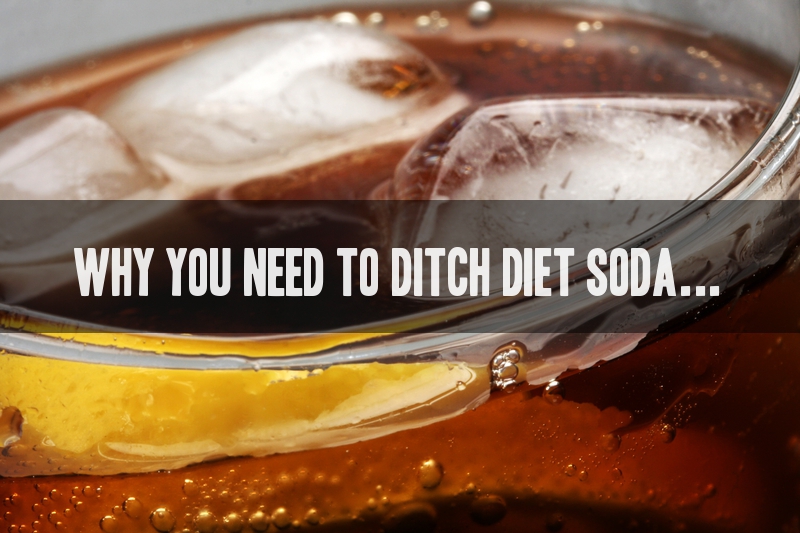Ditch the Diet Sodas and Drink More of This

When it comes to artificial sweeteners, what good news have your heard about them recently? There’s now scientific evidence that artificial sweeteners may have a negative effect on the delicate balance of bacteria in the digestive system (i.e., gut microbiome).
In a study published in the Journal of Toxicology and Environmental Health, Duke University researchers found that consumption of the artificial sweetener sucralose for 12 weeks significantly altered the gut microbiome of rats by reducing the number of good bacteria (i.e., probiotics). Even after a 12-week recovery period, the number of beneficial microbes remained significantly depressed.1
In a recent study published in the journal Nature, a team of researchers led by Dr. Eran Elinav from the Weizmann Institute of Science in Israel found that folks who consumed the commonly-used artificial sweetener saccharin for JUST 5 days experienced significant reductions in carbohydrate tolerance (i.e., glucose intolerance), as well as significant changes in the composition and function of their gut microbiome (i.e., gut dysbiosis).2
With regard to weight management, the evidence that gut dysbiosis, which refers to an unhealthy imbalance of bacteria in the gut (e.g., too much “bad” bacteria, not enough “good” bacteria), contributes to obesity is so strong that Dr. Patrice Cani and his colleagues at the Metabolism and Nutrition Research Group in Belgium have coined the term “MicrObesity” to describe the relationship.3 For instance, research has shown that gut dysbiosis can increase the number of calories you absorb from food.4
If you needed another reason to drop your habit of drinking diet soft drinks, which are typically artificially sweetened, a just-published study provides evidence that artificially-sweetened diet sodas can hinder weight loss. While animal studies have linked artificial sweeteners to weight gain and obesity, this is one of the first studies to demonstrate that drinking diet soft drinks may have a negative impact on a weight-loss program.
In the study, which had no financial ties to the beverage industry and was published in the American Journal of Clinical Nutrition, researchers from the University of Nottingham assigned 62 women, who regularly consumed diet beverages and were trying to lose weight, to one of two groups.5 Half of the women were instructed to replace zero-calorie, artificially-sweetened beverages (i.e., diet sodas) with water after their main meal (i.e., lunch), while the other half continued to drink diet sodas. The women in the latter group drank only one diet soda per day after lunch.
The researchers tracked the progress of the women for 24 weeks, and all the women were instructed to follow the exact same weight-loss program including a reduced-calorie diet. As expected, at the end of the trial, all the women lost a significant amount of weight.
However, the women who replaced diet beverages with water lost, on average, 16% more weight than the women who drank diet sodas—and remember, they only drank one diet beverage per day. Not only that, the women who drank water experienced improvements in their insulin sensitivity and carbohydrate tolerance that were 70% and 42% greater, respectively, than the group who drank diet beverages.
This study provides evidence that replacing artificially-sweetened diet beverages with water may lead to greater weight loss during a weight-loss program. Remember, water makes up nearly 60% of the human body, and inadequate hydration can negatively affect metabolism, cardiovascular function, focus, and more.
Now, when it comes to drinking diet sodas, for most people, it’s habitual. Maybe you always have one in the mid-afternoon. Maybe every time you stop at a gas station or convenience store you pick one up—sometimes not even knowing you did until you’re driving down the street. The point is that the first step in breaking the habit is identifying potential triggers, including your environment. Creating that level of awareness is the key to change. For example, some people even find that they need to take a different route to work to break the cycle.
If plain, filtered water sounds boring to you, try adding some fresh squeezed lemon or lime to your water. You can even infuse water with various fruits (e.g., berries), vegetables (e.g., cucumbers), and herbs (e.g., basil) to provide flavor and variety. While water is a prime candidate to replace diet sodas, maybe you find that’s just not cutting it for you. You can find some calorie-free sodas that are made with natural sweeteners (e.g., stevia, erythritol), and they could be a potential replacement that provides you with both carbonation and similar flavor.
Naturally flavored sparkling water is also an excellent option. You don’t have to spend an arm and a leg on the “top-of-the-line” stuff either; the generic brands are just as tasty and equally healthy.
Iced tea (e.g., green, black, white, herbal, etc.) is also a great substitute, particularly if you find that you’ve had a hard time ditching diet soda because of the “pick-me-up” it provides. Not only does naturally caffeinated green tea provide a calm sense of alertness (via combination of caffeine plus theanine), it also contains potent phytonutrients (e.g., EGCG) that boost the metabolism and increase fat burning.
The take-home point is that, despite what most believe, drinking artificially-sweetened sodas may not be as healthy as once thought, and it is possible that they may have a negative effect on weight management, which can be accelerated by replacing diet drinks with water. What’s more, the artificial sweeteners may have a negative impact of the balance of gut bacteria, which can affect virtually every aspect of human health. Coming full circle, what good news have you heard about artificial sweeteners (and diet sodas) lately?






